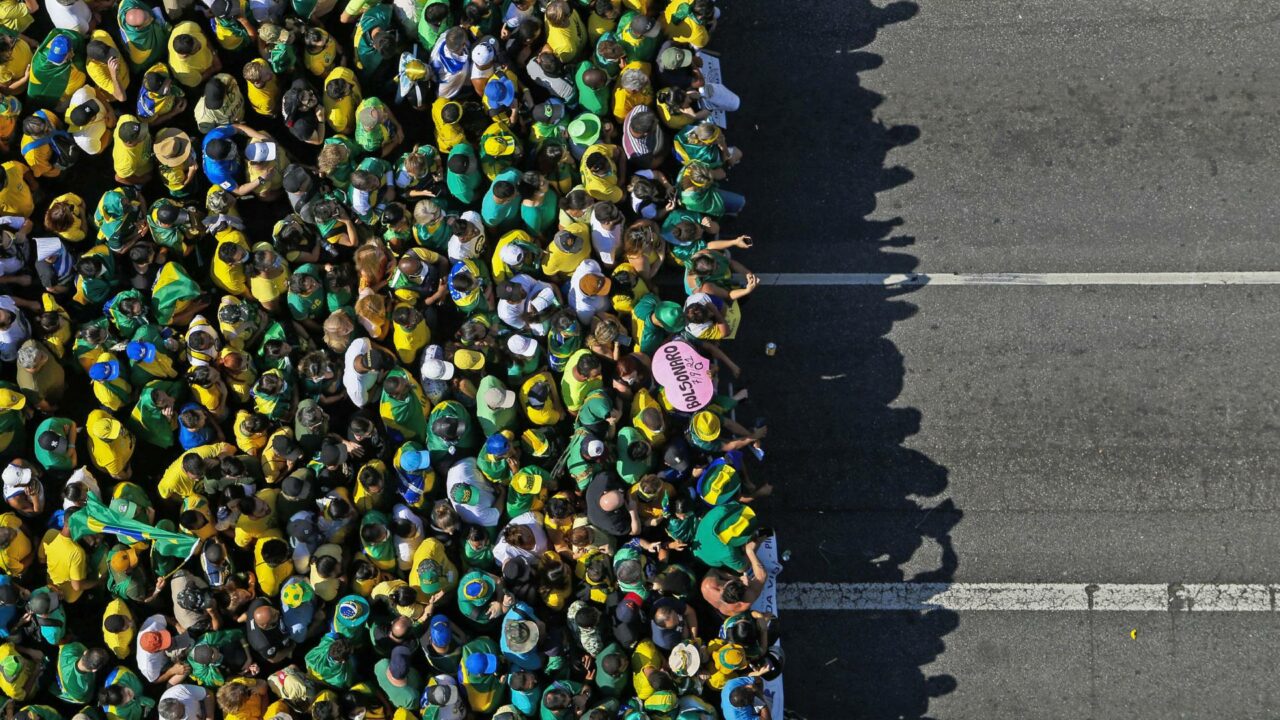Large and potentially-violent protests are likely between the first and second rounds of a presidential election in Brazil, the first of which will be on 2 October.
This assessment was issued to clients of Dragonfly’s Security Intelligence & Analysis Service (SIAS) on 29 September 2022.
We forecast that the vote will lead to a runoff between President Bolsonaro and the left-wing Luiz Inacio Lula da Silva, with the latter winning on 30 October. The president has repeatedly warned that he will only accept an outright victory in the first round. Given this, we anticipate that he will challenge the results on Sunday and mobilise his supporters against the electoral authorities.
We assess that there is a low chance of these protests escalating into widespread unrest. This is mainly because the security forces are unlikely to repress these, nor is the military likely to interfere in the electoral process. Based on recent pro-Bolsonaro rallies, we anticipate that tens of thousands of his supporters will gather countrywide after the first round, particularly in Brasilia and Rio de Janeiro, where he is particularly popular. During these, roadblocks by truck drivers and attempts to vandalise or storm public buildings are likely. But the police appear to have a robust security operative in place to prevent this.
Election forecast
We are very confident that Brazilians will choose Lula da Silva as the next president of Brazil. He has been consistently leading the polls in recent months (see graph below), although he will probably fail to gain more than 50% of the votes on 2 October needed to avoid a second round. As happened in 2018, President Bolsonaro will probably perform better on Sunday than the polls suggest. We learned last month from multiple in-country sources that his supporters are highly sceptical of vote intention surveys, and therefore do not tend to participate in these.

Election day on 2 October will probably pass off peacefully. Ballots close at 1700hrs, when vote records are physically transported to local and state election courts. These are then published online and simultaneously sent to the Supreme Court in Brasilia, an election expert at a Sao Paulo-based NGO told us last month. By 2000hrs, the Supreme Electoral Tribunal (TSE) should announce the provisional results. We anticipate thousands of activists will probably follow the vote count and announcement of results at rallies in central Rio and Sao Paulo, where Bolsonaro and Lula da Silva are respectively planning to be on election night.
Protests likely in the run-up to the second round
The period between the 2 and 30 October is when there is a high likelihood of protests. Bolsonaro has repeatedly promised throughout the campaign that he will ‘reject’ the election results if he does not win outright in the first round. Based on recent polling, this outcome looks very unlikely. So we are very confident that in his Sunday night speech, he will claim irregularities in the vote count. This is likely to trigger a legal claim against the election court, and the start of a campaign as he calls his supporters to demonstrate.
The president has proven to have a large support base countrywide, and he has mobilised tens of thousands of supporters during campaign rallies. Many Brazilians would probably sympathise with these fraud claims, in our analysis. This is not least because former president Lula da Silva is a highly-controversial figure there. So are the electoral authorities. A usually reliable poll from the market survey Datafolha suggested that around 50% of respondents have little or no trust in the electronic ballot system.
The TSE in Brasilia will probably be the main gathering point for pro-Bolsonaro rallies immediately after the election. Given previous patterns of marches in support of the president, other probable gathering points will be the Supreme Court in central Brasilia and the Copacabana beachfront in Rio de Janeiro, which is Bolsonaro’s home state. Smaller groups of around several hundred people would also be likely to gather along Avenida Paulista in Sao Paulo, but he is much less popular there.
We assess that there is a reasonably high chance of acts of violence during rallies. This is based on chatter from pro-Bolsonaro social media channels and encrypted messaging services, in which some of the president’s supporters have called for ‘invading’ state buildings such as the Congress and the TSE, both in Brasilia.
Cities in the states of Bahia, Brasilia, Mina Gerais, Rio and Sao Paulo are where such incidents are most likely, in our assessment. These are the regions where Bolsonaro won the majority of votes in the 2018 election and where incidents of political violence and violent protests have been most frequent in recent years (see map above).
There is a low likelihood of these post-election rallies escalating into widespread unrest. Several sources with access to the security forces told us last month that the military police have been ordered to carefully contain protests as this could spark further unrest given the country’s high levels of polarisation.
The same sources suggested that the army, which is carrying out its own audit of the election, is highly unlikely to engage in Bolsonaro’s fraud claims despite the president probably inviting them to do so. Moreover, Brazil has decades of robust and trouble-free vote count experience. So protests would probably peter out after 30 October.
Risks of road blockades
Other than civil unrest, there is also a high risk of roadblocks around the upcoming election. While we have not seen specific calls for this, truck drivers have supported Bolsonaro during previous campaigns. In September 2021, several hundred trucks blocked highways countrywide for weeks causing severe supply chain disruptions.
During that period, the most affected states were Bahia, Maranhao, Mato Grosso do Sul, Minas Gerais and Santa Catarina. But we anticipate that the police will be on high alert to prevent this. In a sign of preparedness, the army stopped a convoy before it reached Brasilia on 7 September as it tried to reach the TSE.
Crisis Scenarios
We assess that an acute post-election crisis resulting in a sudden and significant worsening of security is extremely unlikely. The overwhelming consensus among our sources in Brazil is that other than among his most ardent supporters, President Bolsonaro is largely alone in his crusade against the electoral court. He is likely to claim that he has the army’s support, as he has done during his presidency. But given the reputational cost it would have for the armed forces, we very much doubt that they would support him. Moreover, they have few incentives to do so for a losing candidate.
Although remote, a crisis would probably involve a post-election protests descending into widespread violent unrest that state-level security forces are unable or willing to contain. The president has the constitutional power to issue an emergency decree allowing the army to help for a temporary period. The graphic below also shows scenarios for the post-election period, each of which include indicators that they are likely.

The main indicators for a crisis that we are monitoring for around the upcoming election are: police repression of protests, the military’s response to the outcome and vote inconsistencies. On current indications, we assess that there is a low chance of any of the three of them happening. So we are keeping our crisis risk and regime instability ratings for Brazil at moderate. The same applies to our city-level civil unrest risk levels for large cities like Rio and Sao Paulo also, which are currently at moderate.
Image: Supporters of Brazilian President Jair Bolsonaro celebrate Brazil’s 200th anniversary of independence in Sao Paulo on 7 September 2022. Photo by Miguel Schincariol/AFP via Getty Images.







